|
|
|
Sort Order |
|
|
|
Items / Page
|
|
|
|
|
|
|
| Srl | Item |
| 1 |
ID:
131537
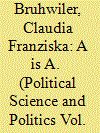

|
|
|
|
|
| Publication |
2014.
|
| Summary/Abstract |
In 1979, writer Tom DeFalco was paired with artist and cocreator of Spider-Man, Steve Ditko, to work on an issue of Machine Man, one of the many superheroes populating the universe of Marvel Comics. Instead of the usual introduction and business chatter, Ditko challenged DeFalco during a first conversation: "Are you Tom? What gives you the right to write about heroes?" (Tucker 2012). By the time of this exchange, Ditko had not only (co-) created and continued numerous superhero stories, ranging from Captain Atom to Dr. Strange or the Hulk, but he had also dedicated a lot of thought to the question as to what composed true heroism. In the 1960s, he had already found answers in a place not uncommon for that time, namely, in the novels of a Russian immigrant whose work should serve, in her own words, as "the projection of an ideal man".
|
|
|
|
|
|
|
|
|
|
|
|
|
|
|
|
| 2 |
ID:
157796
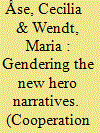

|
|
|
|
|
| Summary/Abstract |
During the 20th century, wars were fought primarily in the name of protecting the homeland. Making the ‘ultimate sacrifice’ was a national masculine duty and a key feature of military heroism. Today, human rights and international values justify war-making and legitimise military action. In one of these post-national wars, the International Security Assistance Force operation in Afghanistan, more than 700 European soldiers have lost their lives. How have these deaths been legitimised, and how has the new security discourse affected notions of masculinised heroism and sacrifice? This article investigates how the dimensions of national/international and masculinity/femininity are negotiated in media narratives of heroism and sacrifice in Denmark and Sweden. Regarding scholarly discussions on the professionalisation, individualisation and domestication of military heroism, the empirical analysis demonstrates that the Danish/Swedish nation remains posited as the core context for military heroism and sacrifice. In the media narratives, professionalism is represented as an expression of specific national qualities. The media narratives conflate nation and family and represent military heroes as distinctively masculine and national figures. It is argued that a family trope has become vital in present-day hero narratives. This trope is disposed towards collective emotions, national loyalty and conservative gender ideals.
|
|
|
|
|
|
|
|
|
|
|
|
|
|
|
|
| 3 |
ID:
131539
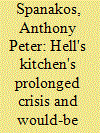

|
|
|
|
|
| Publication |
2014.
|
| Summary/Abstract |
Comic book heroes often have their origins in noir depictions of failed or failing states. The danger involved and the seeming anarchy that necessitates superheroes recall Hobbes's description of a state of nature and Leviathan as resolution. But comic book heroes generally inhabit states that are better identified by the Hobbes-inspired Carl Schmitt. Indeed, this articles argues that while the Hell's Kitchen of Daredevil comics has some characteristics of a state of nature, it is better characterized by the protracted crisis of state that Schmitt sees in liberal democracies. Hobbes and Schmitt elucidate the crisis that generates the need for a superhero but fail to explain why the superhero does not simply take over the city. This is better explained by American concepts of heroism which emphasize redemption and walking away from power (Lawrence and Jewett 2002).
|
|
|
|
|
|
|
|
|
|
|
|
|
|
|
|
| 4 |
ID:
174533
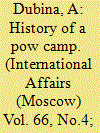

|
|
|
|
|
| Summary/Abstract |
A LOT IS KNOWN about the Great Patriotic War. However, its history is still being written as new documents are emerging from declassified archives, as well as the memoirs of its participants. There is a certain gap between classic academic research involving thoroughly checked facts, verifications, assessments, and evaluations, on the one hand, and naturally emotional publications (memoirs) devoted to specific events and written by war veterans, on the other. One such work is a book by Vasily Ivanovich Kolotusha, a well-known diplomat, Arabic studies expert, Ambassador Extraordinary and Plenipotentiary, entitled "Detention Camp Unknown... Place of Burial, Wlodomierz."
|
|
|
|
|
|
|
|
|
|
|
|
|
|
|
|
| 5 |
ID:
180720
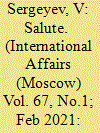

|
|
|
|
|
| Summary/Abstract |
I SPENT much of my childhood in Ukraine. The son of an army officer, I moved from garrison to garrison due to my father's promotions. Each time, I had to adjust to a new group of children, and that wasn't always a smooth process. It was one thing if you were put in, say, a fifth-grade class that consisted of boys and girls of the same age from the entire garrison. Everyone would be glad a new kid had joined the class and friendships were normally quick to develop. But what was happening outside school was a different story: kids of all ages would come together in outdoor spaces and form a group with its own established rules and leaders. That was a milieu you needed some effort to adjust to. You had to go through various trials to win the right to be accepted by the gang as one of their own. But if you were accepted as such, you were one hundred percent safe. The gang would never have betrayed you and would always have protected and taken care of you.
|
|
|
|
|
|
|
|
|
|
|
|
|
|
|
|
| 6 |
ID:
118536
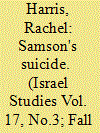

|
|
|
|
|
| Publication |
2012.
|
| Summary/Abstract |
Drawn from the biblical narrative, the image of Samson came to be used as a depiction of the self-sacrificing nationalistic ideal that dominated Zionist ideology. Though much has been said about the popular and widespread use of this image in Israeli society and culture, I contend that it was not solely his heroism, strength, and symbolic identity as the new Jew that marked this biblical figure for reuse in popular forums, but that his final suicide (martyred sacrifice) underpinned the drama of the Samson narrative. The symbolism of Samson soldiers willing to sacrifice themselves for the modern nation state altered as attitudes towards sacrifice for the collective changed. The heroism of the Samson myth collapsed, and subsequently was inverted, becoming a powerful tool for criticizing the Israeli military hegemony. This article traces a literary history of the changing narrative of the archetypal Samson.
|
|
|
|
|
|
|
|
|
|
|
|
|
|
|
|
| 7 |
ID:
160843
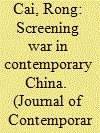

|
|
|
|
|
| Summary/Abstract |
War has been a prominent theme in cultural productions of the People’s Republic of China (PRC). Repeated representations by the socialist cinema and beyond have produced a revolutionary imagination of war that glorifies death and sacrifice, subsuming individual experience of pain and loss under the discourse of the Communist nation-building. This article focuses on a revisionist reading of the revolutionary imagination of war in Feng Xiaogang’s 2007 New Year Film The Assembly. It has a dual focus. First, it discusses the genre practice of war film in the mainland cinema and the relation among war film, representation of violence, heroism, and nation building. Then it examines how Feng’s visceral depiction of combat redirects the focus from the master narrative of nation-building to the individual. Second, focusing on the main character’s quest for honor for his fallen soldiers, this article explores how the film critiques the power structure of the revolutionary honor system that valorizes the revolutionary imagination of war. Ultimately, the discussion proves that the film is as much a confirmation of the revolutionary nation-building as a poignant critique and subversion of the official vision of honor and history.
|
|
|
|
|
|
|
|
|
|
|
|
|
|
|
|
| 8 |
ID:
181225
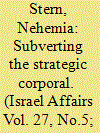

|
|
|
|
|
| Summary/Abstract |
How does the Israel Defence Forces cultivate the image of a ‘hero’ within its combat ranks? By analysing a series of online educational videos on combat heritage, this article will demonstrate how the IDF’s current heroic imagination is grounded in a subversion of the ‘Strategic Corporal’ paradigm. Within this paradigm, junior ranking soldiers are seen as increasing the chaos inherent in asymmetrical conflicts. By contrast, this article will argue that a focus on the learned elements of professionalism and training are seen as creating the conditions wherein every man (or woman) can become a ‘hero’.
|
|
|
|
|
|
|
|
|
|
|
|
|
|
|
|
|
|
|
|
|